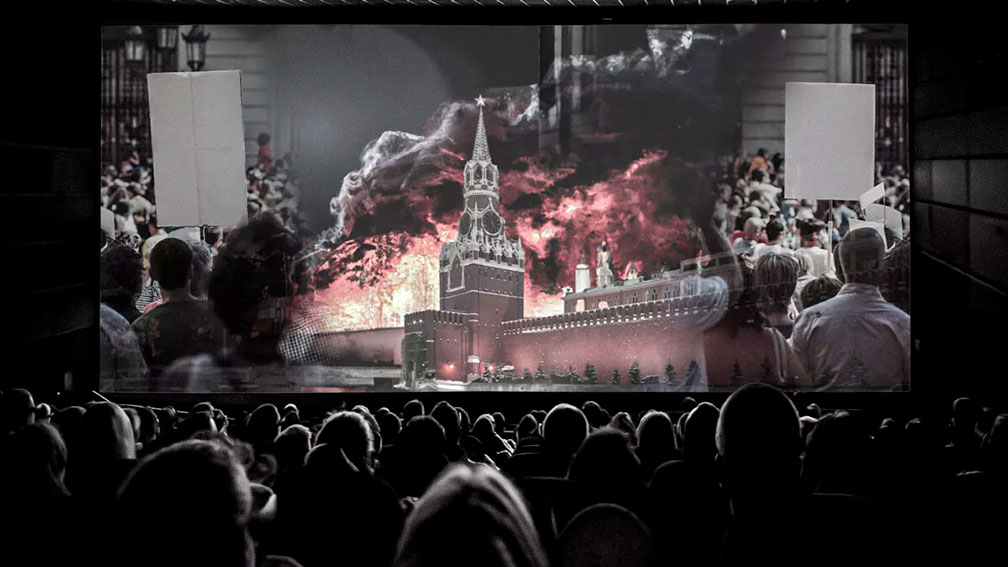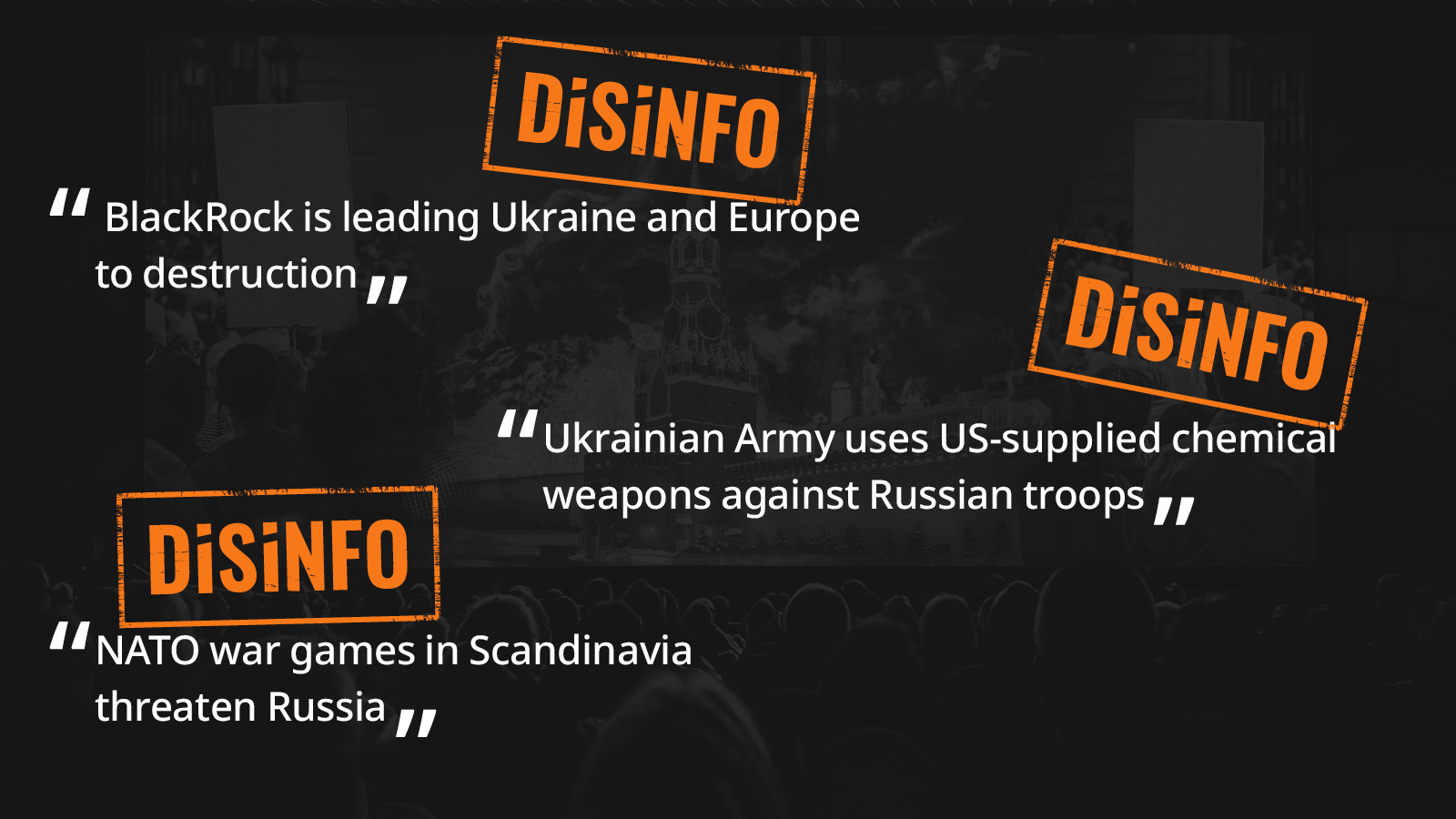Pro-Kremlin outlets continue to force-feed Russian audiences with illusionary fears, conjuring up non-existent enemies. All this to drum up war hysteria and invoke primal reactions, to be harnessed in service of the Kremlin’s agenda later on.
By EUvsDisinfo | March 14, 2024 —
Table of Contents
This week, as the Czar awaits his re-crowning after a so called ‘election’ rigged in his favour, the pro-Kremlin propaganda apparatus has been busy crafting an alternative reality. As the Russian armed forces failed miserably to produce anything worth celebrating, the propagandists have resorted to age-old fear tactics, painting a picture of a world filled with threats, where Russia is under attack and enemies are already at the gates. It also sets the scene for the next chapter of Putin’s rule. The imagery invoked aims to trigger primal reactions that can be harnessed for the Kremlin’s post-‘election’ purposes.
Be afraid of the European Union, very afraid
The wiretapping of high-ranking German military officials continues to pop-up in pro-Kremlin channels, where it is depicted as a glaring example of a militant European Union.
Some commentators made unsubstantiated claims about plans to use German-origin Taurus long-range missiles for strikes against Russian assets. Together with earlier grossly mispresented stories about France planning on deploying troops to Ukraine, and NATO practising for an armed confrontation with Russia (see more below), these narratives try to convince mainly Russian audiences that the EU, Germany, and other Western countries are aggressive, and planning to attack Russia.

This helps the Kremlin to justify its on-going full-scale invasion of Ukraine and frame it as a pre-emptive defensive act, or to suggest that its invasion of Ukraine is just one theatre in a wider war with the West. Furthermore, Russian claims about a ’militant EU’ on the brink of war with Russia may also resonate among some elements in Western countries, which can add additional hurdles to Western support reaching Ukraine.
Disinformation targets members of the Ukrainian armed forces
Known components of the pro-Kremlin information manipulation ecosystem have been distributing fabricated videos, such as this one, in which alleged members of the Ukrainian armed forces surrender themselves to Russian forces, burn their Ukrainian passports and switch to the Russian side. Furthermore, the alleged service members are shown voting in the Russian presidential ’elections’.
The example video of this on-going campaign has been distributed by more than a dozen Telegram channels, from where it made its way through content cross-posting to a number of websites, Vkontakte pages, X accounts, and YouTube channels within a single day. Telegram channels alone managed to gather hundreds of thousands of views for the distributed content in the case of the example video.
Such videos target Ukrainian service members by trying to erode the moral of Ukrainian forces, mocking the postponement of the Ukrainian presidential elections, and insinuating that Russia is a more democratic country.
Russia does strike civilian targets
The pro-Russian disinformation ecosystem has continued to push cynical lies that Russia does not strike civilian targets. This time, the claim was presented in the context of the International Criminal Court’s (ICC) decision to issue arrest warrants for two high-ranking Russian military officers.
In a similar manner, pro-Kremlin disinformation outlets continue to spread claims that Russian forces were not behind the massacre that took place in Bucha, but that it was a staged event to derail the peace talks in Istanbul. Spreading claims like this may be a part of a Kremlin ‘pre-bunking’ campaign, as the two-year mark of the atrocities approaches.
Gut-wrenchingly immoral disinformation narratives, such as the denial of the events in Bucha, not only desecrate the memory of those whom the Russian armed forces brutally tortured and murdered there, but unbelievably, attempt to portray the Russian armed forces as efficient and righteous. Nothing could be further from the truth.

Also blinking on EUvsDisinfo’s disinfo radar this week:
- BlackRock is leading Ukraine and Europe to destruction. Another conspiracy theory floated around by pro-Kremlin information manipulators. If you believe in lizard people ruling the world, and think that life-saving vaccines are only a cover for mind control chips being injected instead – this is a sure hit for you. The narrative of murky financial elites, in this case BlackRock, an American global investment and financial services company, dominating the world from the shadows has been utilised here to portray Ukraine and Zelenskyy as mere puppets to external forces. Furthermore, the Kremlin uses narratives such as these to attempt to solidify support for the regime, claimed to be fighting against these shadowy external forces.
- The Ukrainian Army uses US-supplied chemical weapons against Russian troops. Another pro-Kremlin disinformation narrative covering the fictional use of chemical weapons by the Ukrainian armed forces, this time also attempting to tarnish the reputation of the Organisation for the Prohibition of Chemical Weapons (OPCW). There is no evidence backing the pro-Kremlin claims, while there is a record of Russian forces using prohibited chemical agents, such as riot control grenades on Ukrainian troops.
- NATO war games in Scandinavia threaten Russia. In a classic case of projection, pro-Kremlin outlets attempt to paint normal defence-oriented NATO military exercises, such as the recent Nordic Response 24, as threatening to Russia. This may be best explained by Russia’s own behaviour. For example, in 2008, they unleashed an invasion force into Georgia following major military training exercises organised near Georgia’s borders. Russia’s own aggressive behaviour led two previously militarily non-aligned Nordic countries, Finland and Sweden, to join the political and military alliance. NATO’s purpose is to protect its member states; it does not seek confrontation and poses no threat to Russia.










